What Happens After a Judgment Is Entered Against You?
? How significant or big of an impact will it have on your credit report? These are common questions, especially in today's world, where thousands of Americans continue to struggle financially to keep up with payments. You might be asking these questions right now because you anticipate a judgment is coming, or you've already been notified of a judgment entered against you.
Typically, a judgment refers to an order issued by the courts, legally requiring a person to pay a debt. When you borrow money for purchases and are unable to return payment, say with a credit card account, line of credit from your bank, or in financing a car, those lenders use judgments to recoup those payments. Additionally, service providers can seek judgments against you as well. Perhaps it's an auto repair shop or a cell phone service provider seeking payment. Regardless of the scenarios that brought you to this point, you're now anxious to know what happens after the judgment is entered against you.
Because judgments can be detrimental to your credit report, you'll want to investigate your options for removing them. But it's a order, and it's not like you can just request or dispute your way out of it. A court determined you owed the money. So, what's going to happen now that you have a judgment against you? If you're still unsure, keep reading. DoNotPay has the most painless solution of all.
What Will It Mean to Have a Judgment Against You?
When a , it can be incredibly damaging to your borrowing potential. It signals to anyone inquiring that a lender gave you sufficient time to make payment arrangements but ultimately had to go to court to seek repayment. When a judgment is entered against you, it indicates that you aren't trustworthy enough to repay a debt, even if it was just a one-off circumstance or unintentional oversight that led you here.
There are different types of official judgments, too, each representing a unique path to resolution. So, when you get a judgment against you, start by understanding what type of judgment it is. You can then begin to explore your various options to address it.
| Satisfied Judgments | A satisfied judgment refers to a debt that is either entirely settled or paid. And even if you haven't paid it off completely, you can satisfy a judgment by creating a payment plan with the creditor. |
| Unsatisfied Judgments | This refers to a judgment that has been entered against you that you have not yet addressed. You're expected to honor the court-ordered decision, and until you do so, it's considered an unsatisfied judgment. |
| Renewed Judgments | These types of judgments, depending on your home state, are those that creditors have re-filed against you, should they not have been satisfied after the first filing. |
| Vacated Judgments | If you take your debt to a court or challenge the creditor's attempt to collect via an appeal process, a court could side with you and issue a dismissal. In this instance, the judgment would be considered a vacated judgment. |
What Does a Judgment Look Like on Your Credit Report?
While will show up on your credit report, it will no longer have a direct impact on your credit score. Of course, you still owe the debt and on top of that judgments can still significantly impact your ability to qualify for future loans. The good news is your credit score might not be directly affected. And when you see a judgment on your report, it will usually be displayed with:
- The creditor's identifying information
- Total amount owed
- Date of judgment issuance
How Long Does a Judgment Impact Your Credit Report?
When against you, what happens next could take from six up to ten years. The law allows creditors that much time to seek remedy for defaulted borrowing. And in cases where there are renewed judgments you could be hindered for a very long time. Creditors won't just list the judgment either. They'll often impose methods of collecting payment from you, like it or not, including via:
- Wage Garnishments
- Bank Account Garnishments
- Seizing Assets (Repossession)
- Property Liens
How Can You Get a Judgment Off Your Credit Report By Yourself?
What happens after a judgment gets entered against you and you believe there has been an error? You can always look for ways to address and challenge the judgment yourself. But be warned, it's going to be a complex process requiring several deliberate steps to prove your case. You can begin your next steps by following through on these four potential solutions:
- Ask the Court for Validation. Complete a debt validation letter and submit it to the court. If the creditor cannot verify a negative entry, the Fair Credit Reporting Act requires it to be removed from your credit report.
- File an Appeal. You can seek to file an appeal with the court to try and have the judgment vacated, meaning it would no longer appear in public records or on your credit report.
- Dispute the Judgment With Credit Bureaus. You can complete dispute forms and submit them to TransUnion, Equifax, and Experian directly, citing proof of the error.
- Pay Your Debt and Wait. In a worst-case scenario, you could make arrangements to pay the debt to the creditor and wait for the judgment to fall off your report eventually.
You Could Get a Lawyer, or Let DoNotPay Handle the Judgment
DoNotPay can handle all the details. Should you have a judgment entered against you, don't stress. With a whole suite of products available to help you clean up your credit report, even the nastiest of judgments can be dealt with swiftly.
How to Clean Up the Judgments From Your Credit Report Using DoNotPay
If you want to remove recently entered judgments from your credit report but don't know where to start, DoNotPay has your back in 3 quick and easy steps:
- Search Clean Credit Report on DoNotPay.
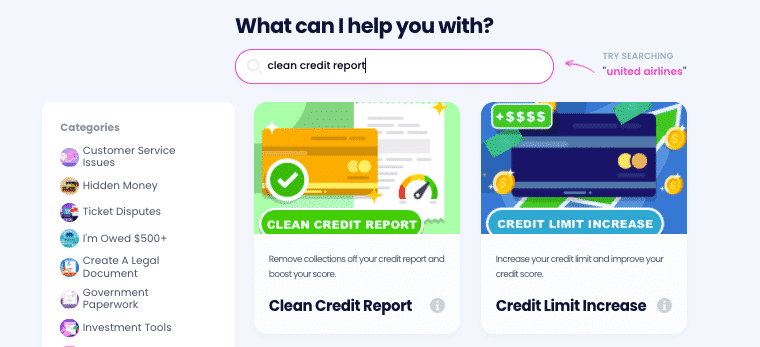
- Prepare a recent copy of your credit report that you can use as reference.
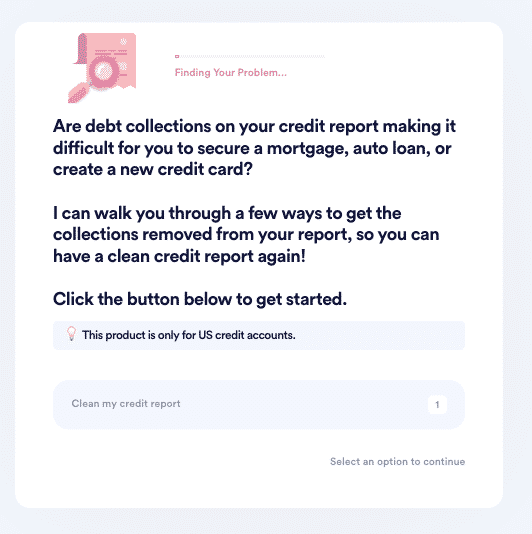
- Let us guide you through the 4 potential options:
- If you've already paid off your debt, we'll help you file a Goodwill Removal Request to get it removed.
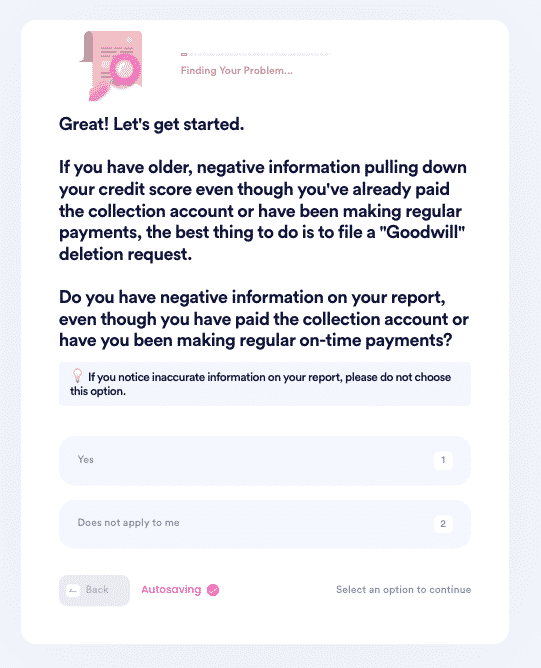
- If you notice any errors in your report (we have a list of common errors you can use!), we'll help you file a credit dispute to the creditor or major credit bureaus.
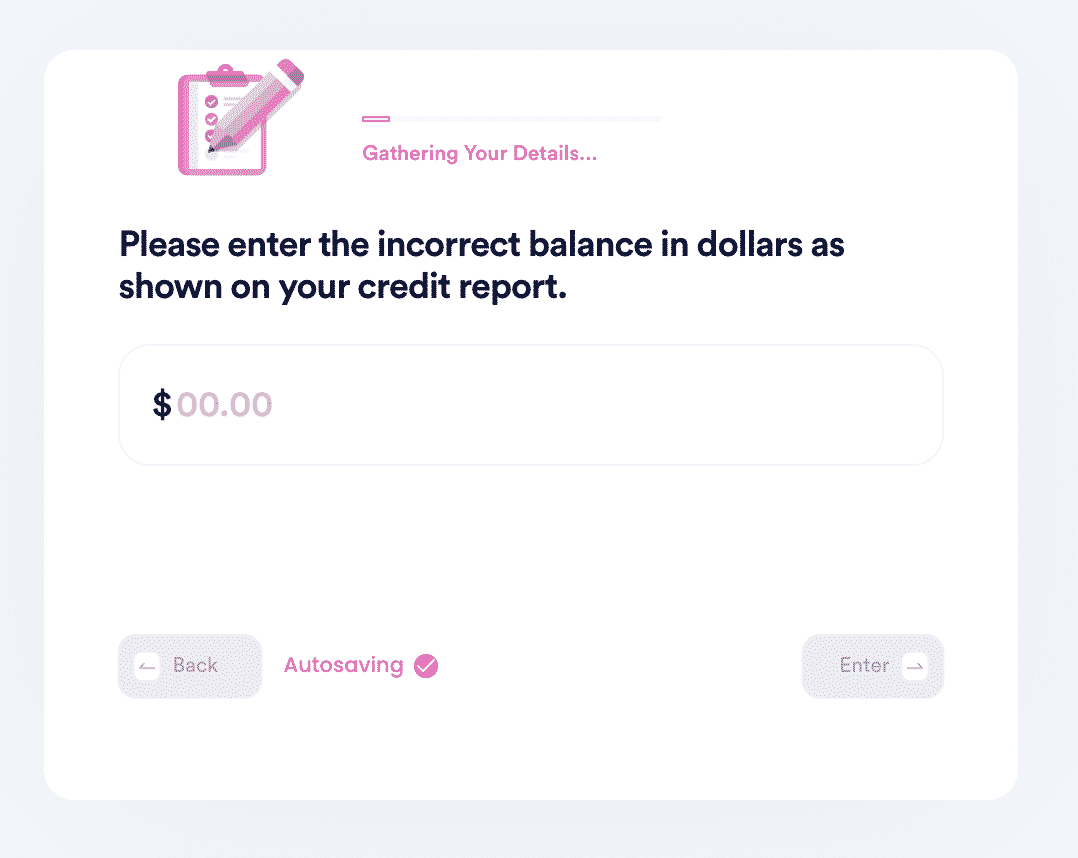
- If there are no errors, we'll check if you're still eligible to file a debt validation request. If they can't validate your debt, they're required to remove it from your report and they can't collect it!
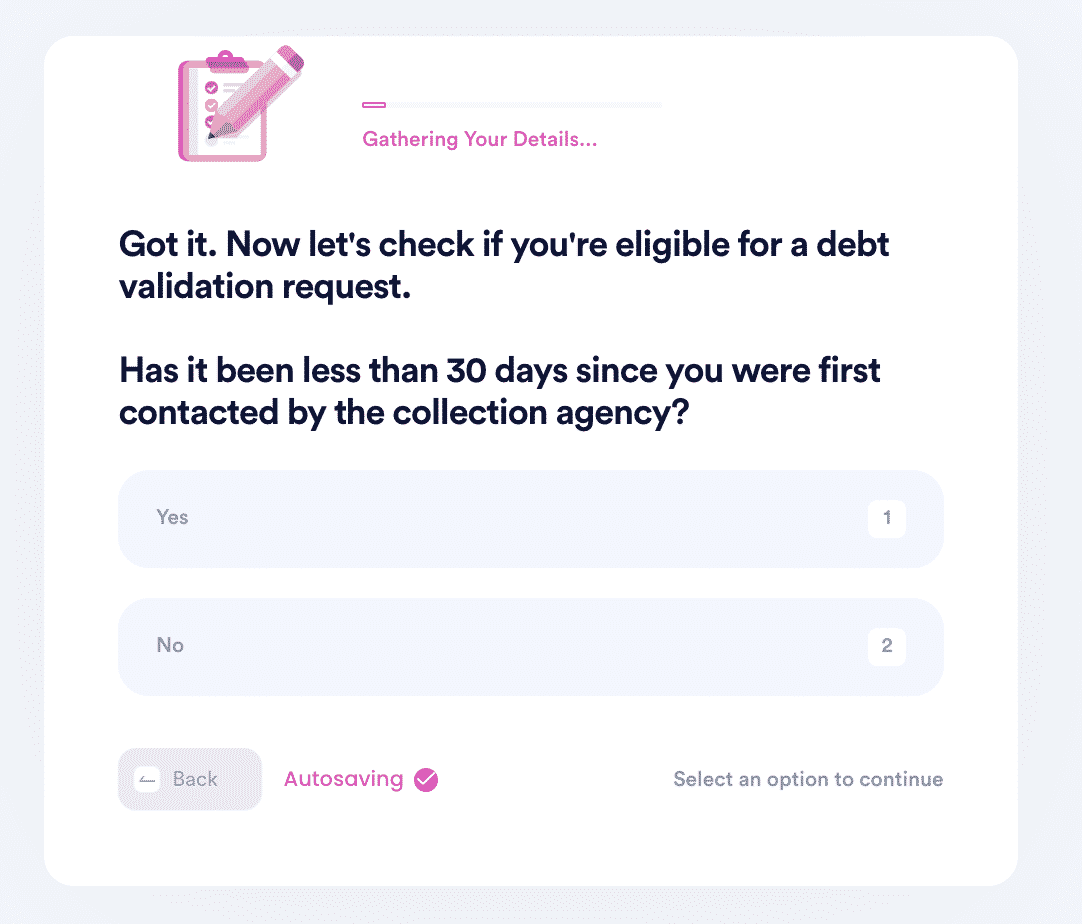
- Lastly, if none of the above options work, we'll help you file a pay-to-delete negotiation letter. You can customize the amount you are willing to pay in exchange for getting the item removed.
And that all there is to it! You can also see some of the other credit products, including Credit Limit Increase, Get My Credit Report, Keep Unused Cards Active, and more.
DoNotPay Can Handle More Than Judgments
Once you're successful in removing the judgment from your credit report, you can explore other clean up efforts to remove other things, like:
- Hard and soft inquiries
- Late Payments
- Collections accounts
And that’s only the tip of the iceberg.
DoNotPay Is a Game-Changer For All Sorts of Tedious Tasks
If your to-do list includes a bunch of tedious tasks that usually require more time than you have and more patience than you can muster, let DoNotPay handle those too.
We have products for lots of other things, like:
- Canceling your unwanted subscriptions
- Appealing financial aid decisions
- Getting help with bills you can't pay
- Learning how to improve your credit score
- Completing a debt validation letter
and it shows up on your credit report? You let DoNotPay help you with your next steps; that's what.
 By
By